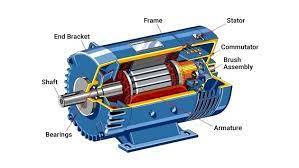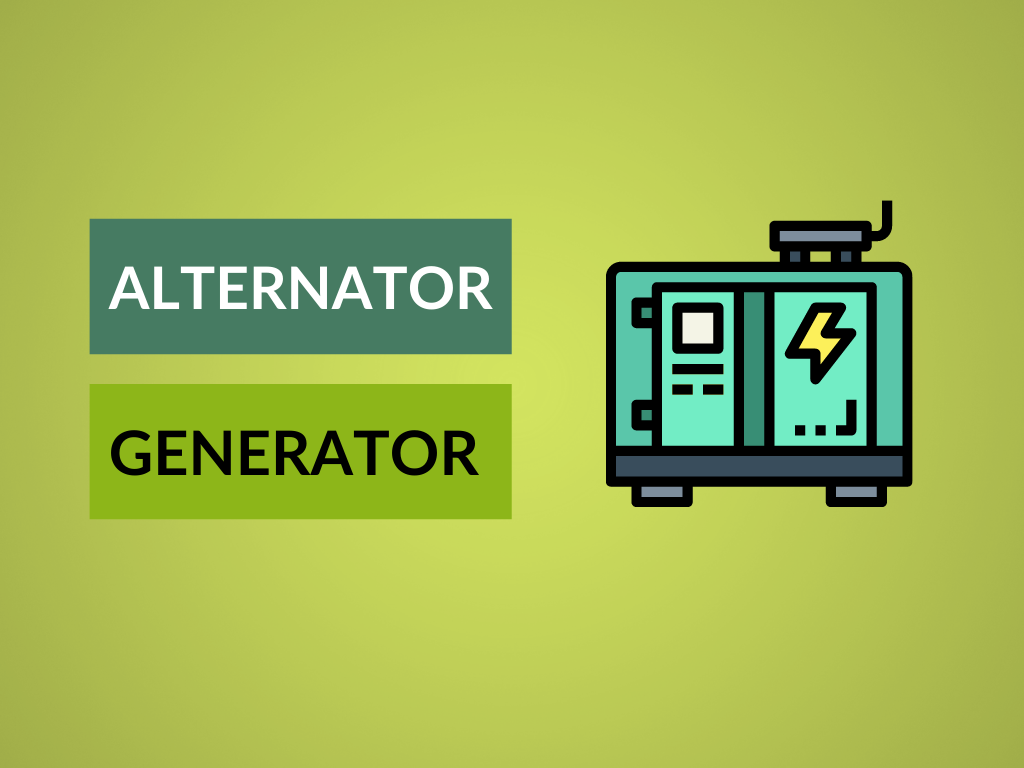The Major Difference Between Alternator And Generator is that in the alternator the armature is stationary and the field system rotates whereas in the generator armature rotates and the field is stationary. The armature of the alternator is mounted on the stationary element called stator and field winding on a rotating element. While the connection of a generator is just the reverse of it.
The alternator and generator both works on the principle of the Faraday law of electromagnetic induction. The generator induces both the alternating and direct current and the alternator produces only alternating current. The rotor of the generator is placed inside the stationary magnetic field. The stationary magnetic field is produced by the magnetic poles. The rotor moves inside the magnetic field, intersects the magnetic line of force which induces the current in the wire.
Every half rotation of the rotor changes the direction of the current which causes the alternating current. For getting the alternating current, the ends of the circuit are directly connected to the load. But for producing the direct current, the ends of the wire are connected to the commutator. The commutator converts the alternating current into a direct current.
Alternator
An alternator could be a device that converts mechanical energy into AC electrical energy. An alternator always induces an AC. Alternators are very efficient. Alternators have a better output than generators. Alternators use only the desired amount of energy and thus, it conserves more energy. Polarization isn’t required within the case of alternators. The magnetic field is observed to be rotating inside the stator of an alternator.


The armature of an alternator is stationary. The alternator takes the input supply from the stator. Alternators have a large range of RPM. Alternators produce voltage only if needed. Alternators are generally smaller in size. The brushes of alternators last longer. Alternators will never charge a dead battery. Alternators are mainly employed in the automobile industry as a charging system for the battery.
Generator
A generator could be a mechanical device that converts mechanical energy to either AC or DC electrical energy. A generator can generate either alternating or DC. Generators are considered less efficient. Generators have a lower output compared with an alternator. Generators use all the energy that’s produced then, they conserve less energy.


Generators have to be polarized after installation. In the case of a generator, the magnetic field is stationary or fixed where the armature winding spins. The armature of a generator is rotating. The generator takes the input supply from the rotor. Generators have a low range of RPM. Generators produce voltage at all times. Brushes of generators last lesser when compared to an alternator. A generator may be used for charging a dead battery. Generators are widely used to produce large-scale electricity.
Electricity Generation
The electricity is generated using Faraday’s law of electromagnetic induction. It states that a current (EMF) will be induced in a conductor if it is placed in a continuously changing magnetic field.
The alternator and generator apply the same principle to generate electric current. The current is generated by changing the magnetic field acting upon a conductor. However, there are two ways to do it. Either rotate the magnetic field (in housing) around a stationary conductor or spin the conductor (in form of a rectangular coil) inside the stationary conductor. In both cases, the magnetic field lines intersecting the conductor vary and it induces an electric current in the conductor.
Difference Between Alternator And Generator table
| Alternator | Generator |
|---|---|
| An alternator is a device that converts mechanical energy into AC electrical energy. | A generator is a mechanical device that converts mechanical energy to either AC or DC electrical energy. |
| Output Current | |
| An alternator always induces an alternating current. | A generator can generate either alternating or direct current. |
| Output | |
| Alternators have a higher output than generators. | Generators have a lower output when compared with an alternator. |
| Energy Efficiency | |
| Alternators are very efficient. | Generators are considered less efficient. |
| Energy Conservation | |
| Alternators use only the required amount of energy and thus, it conserves more energy. | Generators use all the energy that is produced and so, they conserve less energy. |
| Polarization After Installation | |
| Polarization is not required in the case of alternators. | Generators need to be polarized after installation. |
| Magnetic Field | |
| The magnetic field is rotating inside the stator of an alternator. | In the case of a generator, the magnetic field is stationary or fixed where the armature winding spins |
| Input Supply | |
| The alternator takes the input supply from the stator. | The generator takes the input supply from the rotor. |
| Armature Movement | |
| The armature of an alternator is stationary. | The armature of a generator is rotating. |
| Size | |
| Alternators are generally smaller in size. | Generators are larger and require more space to fit in. |
| RPM (Rotation Per Minute) Range | |
| Alternators have a wide range of RPM. | Generators have a low range of RPM. |
| Voltage Generation | |
| Alternators produce voltage only when needed. | Generators produce voltage at all times. |
| Brush Efficiency | |
| The brushes of alternators last longer. | The brushes of generators last lesser when compared to an alternator. |
| Charging of a Dead Battery | |
| Alternators will never charge a dead battery | A generator can be used for charging a dead battery. |
| Uses | |
| Alternators are mainly used in the automobile industry as a charging system for the battery. | Generators are widely used to produce large-scale electricity. |
Output Current from the alternator can be reduced when the alternator speed is reduced. The efficiency of the alternator can be reduced when it runs at a low speed. When the temperature of the alternator increased then the output current will be decreased.
A generator is like an energy engine, which converts kinetic energy into electricity. It consists of a stationary magnetic field, in which a rotating electromagnet i.e. armature spins and hence produces the electrical current. The gasoline-powered generator is one variant, in which the internal combustion engine drives the rotating shaft and then turns the armature. Some other renewable types of energy, wind, and water are useful as different kinds of electricity generators.


